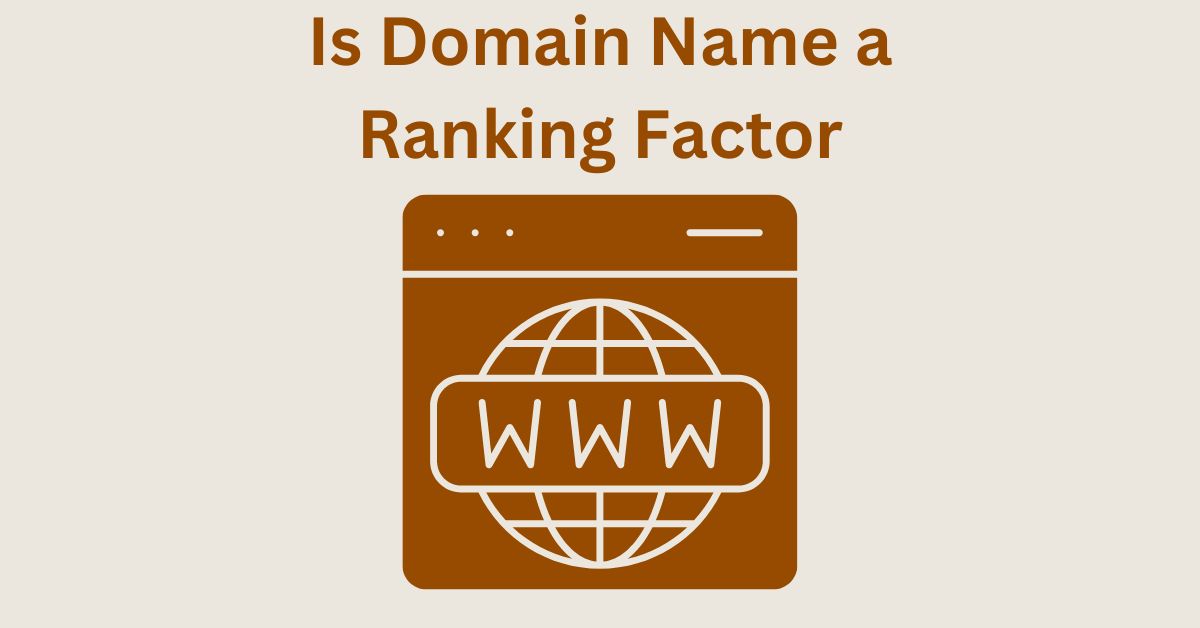Is It True That Domain Name a Google Ranking Factor – Facts, Myths and Some Tips
Estimated reading time: 5 minutes
Last updated on March 26th, 2024 at 07:07 am
Do you want to know “Is Domain Name a Google Ranking Factor”?
Think of your domain name as your website’s address, like a street address for your house.
Now, does the name of your street affect how quickly friends find your home?
It’s a bit like that with Google and your domain name.
While your domain name alone won’t shoot your website to the top of Google’s list, it plays a role in how easily people remember and find you.
A study found that 77% of marketers believe a memorable domain name contributes to brand success.
So, having a domain that’s easy to remember can indirectly impact your website’s visibility.
Here’s the catch: Google uses over 200 factors to decide where your site ranks.
While the domain name isn’t the most powerful factor, it’s a piece of the puzzle.
It’s like having a house with a clear address; it doesn’t guarantee guests will come, but it helps them find you faster.
The short answer to the question is, yes.
Google does allow for domain names in their search engine results pages, so it must be an important ranking factor.
That said, they haven’t confirmed this.
The Significance of Domain Names in SEO
Imagine your website is a book, and the domain name is its title.
Just like an intriguing title makes you want to read a book, a well-chosen domain name can make people more curious about your site.
But how important is it in the world of SEO?
Significance: Your domain name is like a first impression for search engines.
It gives them a hint about your content.
Research shows that 66% of online users believe that a descriptive and relevant domain name is crucial for a website’s success.
While not the sole factor, it contributes to your site’s identity.
Google looks at the overall picture, considering content, backlinks, and other elements.
Having a domain name that aligns with your content can positively influence how search engines perceive and rank your site.
Google’s Official Stance on Domain Names as Ranking Factors
Google, the gatekeeper of the internet, has a say in how websites get ranked. So, what’s their stance on domain names?
Google emphasizes that while domain names matter, they aren’t the only factor.
In fact, Google’s algorithm takes into account a multitude of factors to determine a website’s ranking.
John Mueller, a Google spokesperson, has explicitly mentioned that Google uses “over 200 signals” in their algorithms.
So, while a good domain name can be beneficial, it’s just one piece of the larger SEO puzzle.
Common Myths Surrounding Domain Names and Google Rankings
Exact Match Domains Guarantee High Rankings
Myth: Having a domain exactly matching your target keyword ensures a top spot on Google.
Reality: Google’s algorithm has evolved; exact match domains don’t hold the same weight. Content quality and relevance matter more.
Hyphens Improve SEO
Myth: Using hyphens in domain names helps search engines understand keywords better.
Reality: Hyphens may make the domain look spammy. Google recommends using hyphens sparingly and focusing on user-friendly names.
Older Domains Rank Higher
Myth: Older domains always outrank newer ones.
Reality: While domain age can be a factor, it’s not the sole determinant. Newer sites with quality content can quickly climb search rankings.
Domain Extensions Affect Rankings:
Myth: Certain domain extensions (like .com) rank higher than others.
Reality: Google treats all domain extensions equally. Content quality matters more than the extension.
Factors That Do Impact Google Rankings
Content Quality
Impact: Substantial, as engaging, relevant content attracts visitors and signals authority to search engines.
Backlinks
Impact: Significant, as quality backlinks indicate credibility. Websites with authoritative backlinks tend to rank higher.
Mobile-Friendly Design
Impact: Increasingly crucial, as Google prioritizes mobile-friendly sites for better user experience.
Page Load Speed
Impact: Noteworthy, as slow-loading sites may lead to a poor user experience, affecting rankings.
Keyword Optimization
Impact: Relevant keywords in content and meta tags contribute to better visibility.
Site Security (HTTPS)
Impact: Increasingly important, as Google favors secure sites. HTTPS encryption contributes to trustworthiness.
Social Signals
Impact: Moderate, as social media presence and engagement can indirectly influence rankings.
Click-Through Rate (CTR)
Impact: Notable, as a higher CTR indicates content relevance, potentially boosting rankings.
Page Authority and Domain Authority
Impact: Considerable, as these metrics, measured by tools like Moz, signify a site’s overall credibility and influence its position in search results.
User Experience
Impact: Vital, as a positive user experience, including easy navigation and clear layout, can influence rankings.
Wrapping Up – Is Domain Name a Google Ranking Factor
Your website’s name (domain name) is important for branding and attracting users, but it’s not a direct factor that Google uses to decide how high your site appears in search results.
Google looks at many things like the content on your site, how good it is, how many other websites link to it, and how easy it is for users.
While a catchy and relevant domain name can help people remember your site, it’s just one piece of the puzzle.
To do well on Google, you need good content, links from other sites, and a site that’s easy for people to use.
